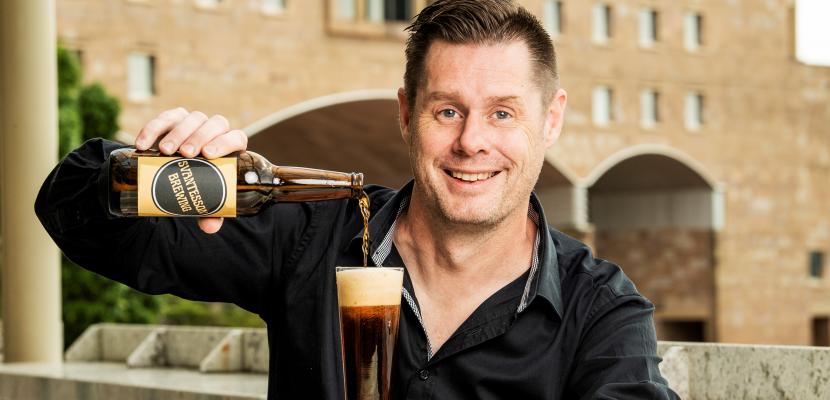
Would a Czech pilsner by any other name taste as bitter?
Australian craft beer enthusiasts could soon find out amid a push by European brewers to protect the names of beer styles in the same way French winemakers jealously guard Champagne and Bordeaux.
Bond University law professor and champion amateur brewer Dan Svantesson, pictured, said the free trade deal being negotiated between Australia and the European Union could fall flat with beer drinkers accustomed to identifying brews by their geographical names.
Think Munich helles, Irish stouts, Scotch ales, Berliner weisses and India pale ales (which originated in the UK).
“No brewer should be allowed to mislead consumers. If I buy a Czech pilsner, I want it to be brewed in the Czech Republic according to their traditions,” Professor Svantesson said.
“But as long as everything is transparent, I see no problem with an Australian brewer selling a Czech-style pilsner.
“If we can’t use that sort of indicator, both Australian brewers and consumers will suffer.
“A Czech-style pilsner will instead have to be described by its production method and ingredients, such as a clean, rich, bitter pale lager using a decoction mashing process brewed predominantly with pilsner malt, soft water, and Saaz hops.”
Try wrapping your tongue around that after a couple of 7 percent Belgian lambics.
Talks on the Australia-European Union Free Trade Agreement have dragged on since 2017 but there is a renewed push to get a deal done, and the Europeans have identified the protection of geographical indications (GIs) as a key objective.
GIs are words that identify a product originating from a particular place, such as Irish Whiskey, Kalamata olives and Roquefort cheese.
Currently the EU is asking Australia to protect six beer varietals under any deal, including Münchener Bier and České pivo.
“GIs have the potential to seriously impact Australian brewers, for example where the use terms like Bavarian-style, or Czech-style beer,” Professor Svantesson said.
“Even in amateur brewing competitions, beers are grouped into styles that often are associated with a location, such as Czech Lager, Munich Helles, or Baltic Porter.”
It’s an issue that’s personal to Professor Svantesson - his chocolate Baltic porter was recently judged Best of Show at the 2022 Queensland Amateur Brewing Championship, scoring 48 out of 50 points and beating 580 competing beers.
“Geographical Indications can play an important role in informing consumers and protecting producers,” he said.
“But they can also cause problems for consumers and producers because beer styles are very often linked to places.
“We talk about East Coast IPA or West Coast IPA, Munich Helles, and in the case of my winning beer, Baltic Porter.
“Consumers form expectations based on these place-based labels.
“Without that, it is much more difficult for brewers – especially craft brewers promoting new products – to inform consumers about what they are selling.”
Professor Svantesson is writing a book about beer law with six fellow professors including from Bond University and beer-brewing powerhouses Germany, Belgium and the Czech Republic.
“In the book we will explore how beer has impacted law, and how law has impacted beer,” he said.
“Beer is a product of worldwide interest, and beer and brewing are heavily regulated.
“Law is of fundamental importance when it comes to beer, stretching back to the 1516 Bavarian Purity Law, Das Reinheitsgebot, that stipulates that only three ingredients can be used to brew fine German bier: water, malt, and hops.”